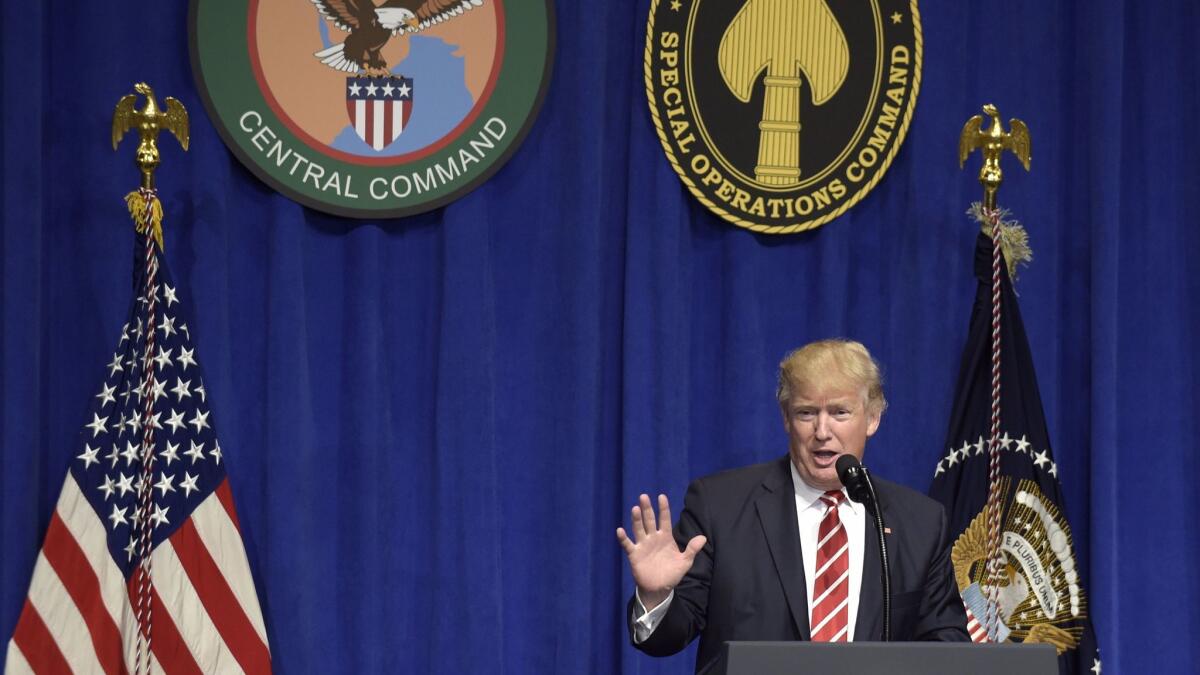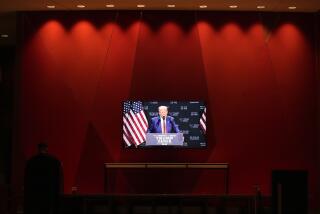Trump, shifting course, vows support for NATO military alliance

Reporting from Washington — Before taking office, Donald Trump repeatedly questioned the role of the NATO military alliance, a bedrock of European stability and transatlantic relations since 1949, calling the security pact “obsolete” as recently as last month.
On Monday he dialed back, adopting the far milder critique that President Obama and other presidents have used.
“We strongly support NATO,” President Trump said at MacDill Air Force Base in Tampa, Fla. “We only ask that all of the NATO members make their full and proper financial contributions to the NATO alliance, which many of them have not been doing. Many of them have not been even close.”
Previous presidents had lamented the failure of many in the alliance to provide for joint defense. Only five of the 28 members — the United States, Greece, Poland, the United Kingdom and Estonia — meet the alliance’s target of spending at least 2% of their gross domestic product on defense.
On Sunday, Trump spoke with NATO Secretary General Jens Stoltenberg by phone and agreed to attend the annual NATO summit in Brussels in May, according to a NATO statement. The White House confirmed the plan.
Trump disclosed his shift on the North Atlantic Treaty Alliance in brief comments to about 300 soldiers at MacDill. He also attended briefings there by U.S. Central Command and U.S. Special Operations Command, which are conducting military operations against Islamic State in half a dozen countries.
“Radical Islamic terrorists are determined to strike our homeland as they did on 9/11, as they did from Boston to Orlando to San Bernardino, and all across Europe,” Trump told the troops. “You have seen what happened in Paris and Nice. All over Europe it’s happening.”
Days after a senior White House aide complained that news media had failed to report a nonexistent “massacre” in Kentucky, Trump suggested that journalists deliberately ignore terrorist attacks.
“It’s gotten to a point where it’s not even being reported,” he said. “And in many cases, the very, very dishonest press doesn’t want to report it. They have their reasons and you understand that.”
It’s unclear which attacks he had in mind because news media have devoted extensive resources to covering both terrorist plots and counter-terrorism operations since the Sept. 11 attacks in 2001.
The administration has disputed critical coverage of last week’s special operations raid at an Al Qaeda compound in Yemen, insisting it was a success despite the death of a U.S. Navy SEAL and the reported deaths of up to a dozen women and children.
Without citing Yemen, Trump told the troops that “today we deliver a message in one very unified voice to these forces of death and destruction: America and its allies will defeat you.”
Trump also defended his executive order blocking U.S. entry to migrants or other visitors from seven majority-Muslim countries, a move that the White House said was aimed at preventing terrorism. The travel ban was in legal limbo Monday after a federal judge in Seattle blocked it.
“We need a strong program so that people that love us and want to love our country and will end up loving our country will be allowed in,” Trump said. “Not people that want to destroy us and want to destroy our country.”
Gen. Joseph Dunford, chairman of the Joint Chiefs of Staff, and Michael Flynn, Trump’s national security advisor, joined the president at the base, a crucial node in the war against Islamic State.
U.S.-backed Iraqi forces are preparing to expand their operation in Mosul by crossing the Tigris River to assault west Mosul, an Islamic State bastion in the sprawling city.
U.S. commanders say the attack will be difficult because west Mosul is more densely populated and more heavily defended than the city’s eastern half. The effort to retake the city began in mid-October but has repeatedly stalled.
Trump may seek to increase U.S. involvement, but that would be counterproductive, said Michael Knights, Iraq fellow at the nonpartisan Washington Institute for Near East Policy.
“There are no more actions that the Iraqi government will allow,” he said. “U.S. and coalition assistance is maxed out: This is an Iraqi fight and the pace will be limited by their energy levels.”
In Syria, a loose alliance of fighters dominated by ethnic Syrian Kurds are pushing toward Raqqah, Islamic State’s self-declared capital. Syrian Democratic Forces, backed by U.S. airstrikes, have retaken several nearby towns and have cut some supply routes.
Although the Pentagon has given rebel forces armored vehicles and other equipment, Obama did not send weapons to the Kurds, who are seeking a breakaway Kurdish state, to avoid further inflaming relations with Turkey, a NATO ally.
Trump may decide to arm the group to increase the pace of operations against Islamic State, but officials said no decision has been made.
Times staff writer Brian Bennett contributed to this report.
Twitter: @wjhenn
ALSO:
Climate change is real: Just ask the Pentagon
Overweight, tattooed, stoned? The Pentagon may still want you
More to Read
Get the L.A. Times Politics newsletter
Deeply reported insights into legislation, politics and policy from Sacramento, Washington and beyond. In your inbox three times per week.
You may occasionally receive promotional content from the Los Angeles Times.











